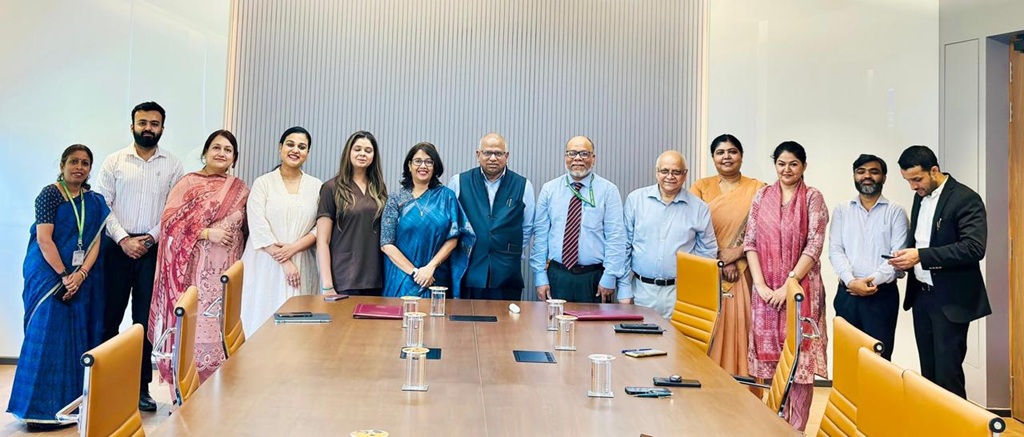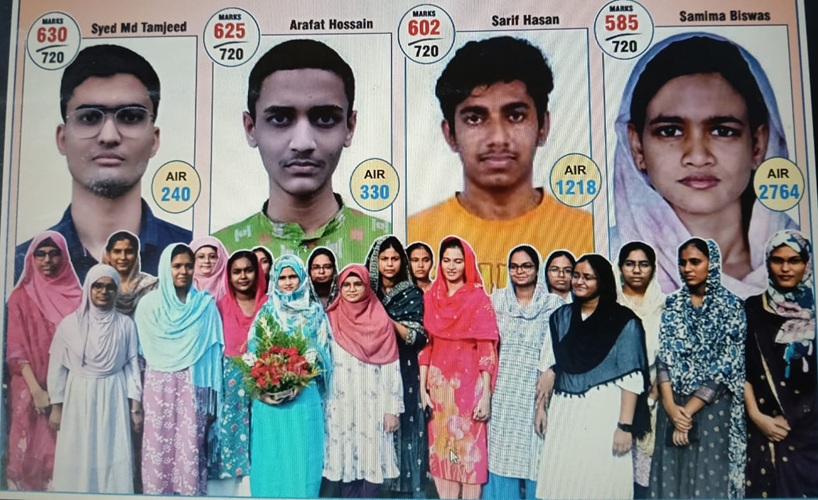Various communities (with different religion, caste and languages) living together for more than thousands of years made India a great nation. Call for ‘Sabka Saath – Sabka Vikas’ reflects inclusive growth opportunities for all Indian workers. We cannot segregate our economy on the base of region, religion, caste or language. At some point we need to transact with businessmen of other region, religion or caste. So, despite all differences, there is need to maintain business harmony in India.
With 40% illiteracy and 31% head counts living below the poverty line, Indian Muslims are slowing down national economic growth. Thus to develop Indian economy in a balanced way, we need to address the reasons behind financial exclusion and economic plight in Muslims because Muslims plays vital roles in manufacturing, trade, construction, transport, storage and communication activities. As much as 20.5% Muslims workers are in manufacturing activities followed by 12.4% Hindu upper caste workers. Similarly 16.8% Muslims are in wholesale and retail trade again followed by 13.4% Hindu upper caste. Muslims in construction are 6.8% followed by 5.1% Hindu OBCs. In Transport, storage and communications 6.4% Muslim are there followed by 4.8% Hindu upper caste.
With poorest access to finance, Indian Muslim workers failed to convert their skills and resources into entrepreneurial assets. Without corporate vision and support, 97% Muslim workers are engaged in unorganized sector. As much as 85.6% Muslim workers have to either work on own account; or are unpaid workers in family enterprises; otherwise are counted as casual workers.
With 7.4% Muslim’s share in Time Deposits against 4.7% share in Credits disbursed by SCBs on 16th September 2016, we observe that Indian Muslims suffer financial losses (in terms of bank credits) worth Rs. 1,95,739.61 crores. With such huge financial loss, we cannot expect Muslims contributing positively in economic growth.
| Deposits and Credits with Scheduled Commercial Banks (SCBs) (as on 16th September 2016) | Amount in Rs. Crores |
| Aggregate Time Deposits in SCBs | 84,38,294 |
| Total Credit extended by SCBs | 72,49,615 |
| National level Credit Time Deposit Ratio (in percentage) | 86% |
| Muslim’s share in Time Deposits (7.4%) | 6,24,433.76 |
| Muslim’s share in Outstanding Credit by SCBs (as par 4.7%) | 3,40,731.91 |
| Expected credit to Muslims | 5,36,471.51 |
| Deficit in extended credits for Indian Muslims | 1,95,739.61 |
| Credit Time Deposit Ratio (Per cent) for Indian Muslims | 55% |
| Difference in Credit Time Deposit Ratio (Per Cent) for Muslims | – 31% |
Since the Interest based lending contradicts with Islamic law, in absence of regulatory framework for interest free banking, Indian Muslims find it difficult to choose between religious ethos and finance on interest terms for growth. Ultimately the banking and finance sector is almost barred for Indian Muslims. Muslim’s presence in the RBI is just 0.75% against 13.47% share in India’s population.
After recognizing the needs of financial inclusion for inclusive growth, much has been done by the RBI to ensure sector, region, caste and gender based financial inclusion. Last year taking inspirations from hon. Prime Minister’s motivational remarks during 80th anniversary celebrations of the RBI, the Committee on Medium-term Path on Financial Inclusion was constituted with objective of working out a medium-term measurable action plan for financial inclusion. In December 2015, in it’s report that committee duly recommended to open specialised interest-free window with simple products like demand deposits, agency and participation securities; offering products based on cost-plus financing, deferred payment and deferred delivery contracts. Fifth chapter in that report was on Interest free banking.
By 29th August 2016, towards mainstreaming the community who have been somehow financially excluded for religious reasons (that preclude them from using banking products with an element of interest) RBI in its Annual Report 2016 (vide Section VI-25) proposed to explore the modalities of introducing interest-free banking products in India in consultation with the Government. Considerably the central board of RBI has made these sincere recommendations with sole objective to ensure financial inclusion in India. There is nothing about Shariah auditing or screening in the proposed interest free banking. After all RBI is supposed to maintain its secular decorum while ensuring 100% financial inclusion.
Under equity and lease based financial models, the poorer can avail finance at no risk or cost, but certainly needs to prove strong business proposal along with attractive cash flow and attitude to draw investor’s attraction. Such model does not allow investment into unsound and unethical proposals along with discouraging over indebted customer base; thus insulates banks from higher NPAs. This also safeguards banks from risks associated with monopolistic competitions to get higher shares in outstanding bank credits. Since cost plus finance, equity and lease based products are supposed to be executed through legal contracts only after verification of tangible assets, it declines the scope for frauds through paper works only.
Islam encourages alms, charity and benevolent loans to promote welfare economics. Islam allows earning wealth through fair trade and commerce to earn money but precludes business transactions containing interest, speculation and gambling etc. Islam also discourages the flow of capital among the richer only; and guides to allow poor to access capital by mode of equity participations. It guides humanity for expenditure based economic development.
Considerably there is not a single reference about any banking model in Islamic scriptures including Quran and Hadiths. During Islamic revolutions (Prophethood and Caliphs periods) there was institution called Baitulmaal (Public Treasury) wherein wealth was never stocked rather instantly allocated on need basis. Institution of Baitulmaal can no way be comparable with any bank. So, terming interest free banking as Islamic banking would be an exaggeration only. Thus there is need to avoid terming Interest free banking as Islamic banking.
Opening gateway for interest free banking and finance in India would help raising tax revenues along with drawing up foreign capital without interest to meet financial needs for infrastructure development. This would help reducing interest payments burden on public debts. Reduced debt burden would help India relax tax structures; ultimately helping to reduce the cost of output and inflation level in the economy.
Besides introducing interest free banking products into existing banks, there is huge untapped potential for innovative financial products in companies dealing in housing finances and insurances. With induction of financial products designed by combining equity and lease for housing finance would help extending reach of housing finance companies to many new customers. Similarly by promoting mutual insurance linked to equity based pool fund may help extending reach of insurance companies to many new customers. Mutual insurance would allow attracting more and more customers in bulk along with lowering the costs of insurance for customers and companies.
We need evaluating interest free financial products as tool to ensure financial inclusion so as to improve capital output ratio for Muslim workers engaged in activities like manufacturing, trade, construction, storage and communication etc. Otherwise if we count these products as Islamic finance products, we may put our socio – political environment into risks only and may miss opportunity to develop India along with putting curb on fiscal imbalances and inflation.
Thus let interest free financial products be introduced as means for financial inclusion for inclusive growth only. It should be equally acceptable to all Indians and nothing special for Indian Muslims. This will help developing our economy along with ensuring ‘Sabka Saath Sabka Vikas’ with better growth rate.
We expect that our honourable Prime Minister would now take required initiatives upon the recommendations on Interest free banking made by the central board of RBI like he did last year through his motivation remark to guide RBI constituting the Committee on Medium-term Path on Financial Inclusion. Now the Government of India is expected to support and guide RBI setting modalities for introducing interest free financial products and services in our existing banks. This will help ensuring ‘Sabka Saath Sabka Vikas’; otherwise terming interest free banking as Islamic banking may just create socio – political conflicts without any gain for India.
(Syed Zahid Ahmad Alig can be contacted as economicinitiatives@gmail.com)






0 Comments